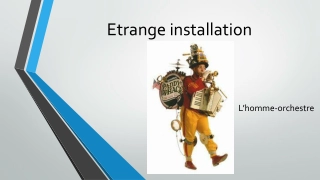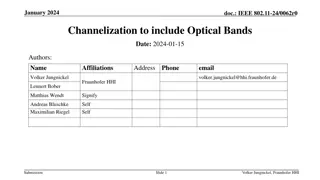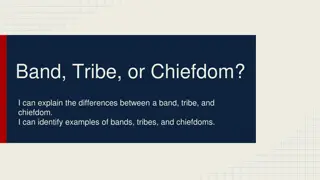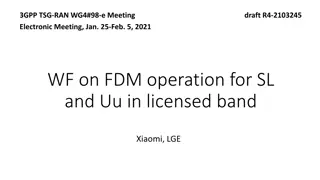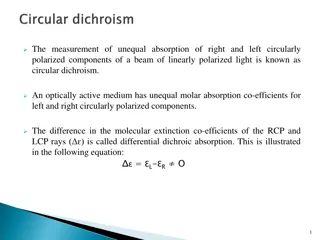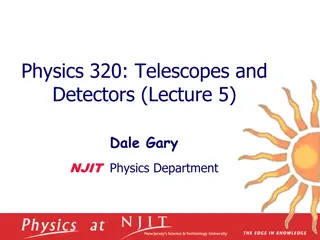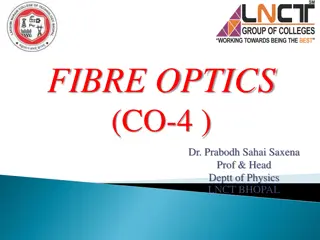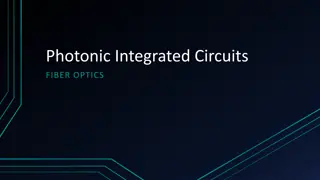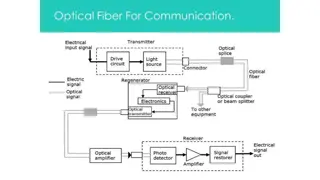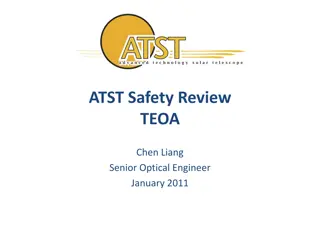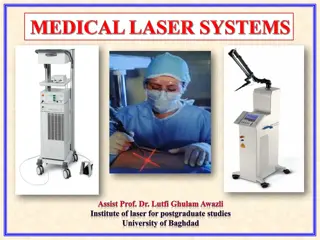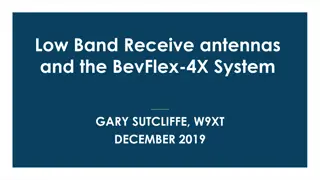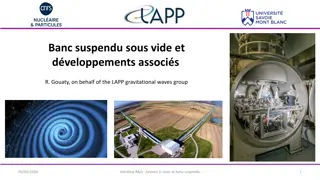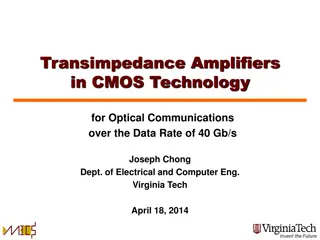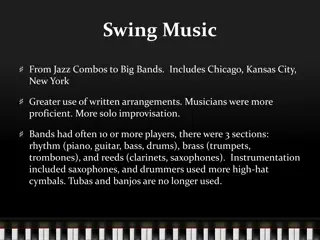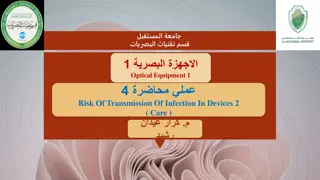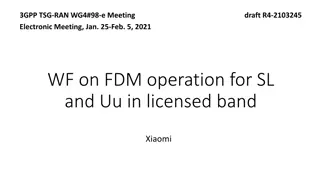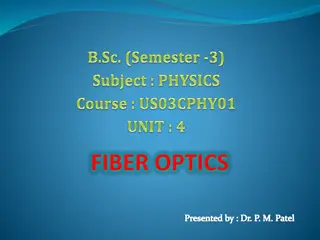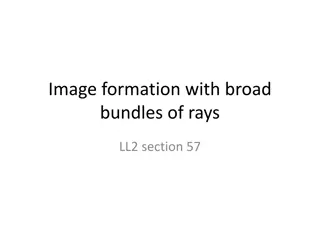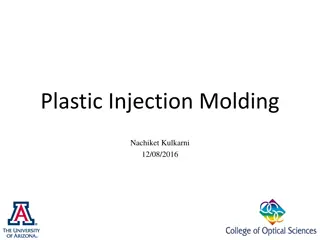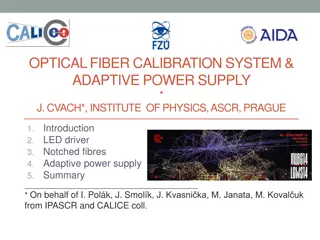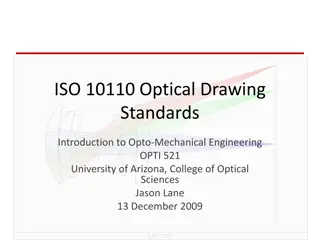Explore the World of One-Man Bands
Dive into the fascinating world of one-man bands through an intriguing article discussing the history of these unique musicians, famous examples like Solsir pifpan and Rémy Bricka, a short film showcasing two one-man bands, and engaging classroom activities to explore different musical instruments
1 views • 13 slides
Update on Bluetooth SIG's Spectrum Sharing Plans
This update discusses Bluetooth SIG's actions and plans for sharing the 5 and 6 GHz bands with incumbents and unlicensed devices. It highlights the goals, the overall plan, recent actions, and collaboration with the Wi-Fi industry to enable equitable sharing of these bands. The detailed plan involve
0 views • 9 slides
Channelization to Include Optical Bands in IEEE 802.11 Standards
This document discusses the proposal to incorporate optical bands into the channelization framework of the IEEE 802.11 standard. It aims to align the channelization approach for integrated LC with that of mm-wave technology in the IMMW scope. The contribution highlights recent works, emphasizing the
2 views • 11 slides
Social Organization: Bands, Tribes, and Chiefdoms Explained
In social organization, cultures have evolved through bands, tribes, and chiefdoms. Bands are small, egalitarian groups practicing hunting and gathering. Tribes support larger populations with agrarian lifestyles and temporary land ownership. Chiefdoms, the most complex, are stratified societies wit
1 views • 11 slides
Proposed Changes to Probation Service Pay Bands and Pay Points
This multi-year deal for the Probation Service outlines proposed changes to pay bands and pay points for the years 2022/23, 2023/24, and 2024/25. It includes numerical and alphabetical comparisons between current and proposed pay structures for different bands, along with a focus on specific pay ban
0 views • 14 slides
Explore Heights HS Band Program: Directors, Ensembles, & Opportunities
Get to know the Heights HS Band program through an online interest meeting. Meet the talented directors - Antwuan Walters, Stephen Becker, and Matthew Caballero. Discover the diverse ensembles available, including Marching Band, Concert Bands, Jazz Bands, and Percussion Ensemble. Learn about the uni
0 views • 11 slides
Discussion on FDM Operation for SL and Uu in Licensed Band at 3GPP TSG-RAN WG4#98-e Meeting
The 3GPP TSG-RAN WG4#98-e meeting discussed introducing Frequency Division Multiplexing (FDM) operation for Uplink (UL) and Secondary Link (SL) in licensed bands. Topics included frequency separation, power control, RF architecture, and intra-band Carrier Aggregation (CA). Options were considered fo
0 views • 10 slides
Optical Properties of Optically Active Compounds
Circular dichroism and optical rotatory dispersion are important techniques for studying the optical properties of optically active compounds. Circular dichroism measures the differential absorption of left and right circularly polarized light components, while optical rotatory dispersion studies th
0 views • 17 slides
Understanding the Impact of Temperature on Fermi Level in Semiconductors
The Fermi level plays a crucial role in determining the behavior of electrons in semiconductors at different temperatures. As temperature increases, the Fermi level shifts, affecting the generation of free electrons and holes in the valence and conduction bands. In intrinsic semiconductors, electron
2 views • 53 slides
Understanding Optical Telescope Types and Lens-Maker's Formula
Optical telescopes utilize lenses or mirrors to collect and focus light for imaging celestial objects. The lens-maker's formula is crucial for determining the focal length of lenses, considering factors like index of refraction and radii of curvature. Different lens configurations and materials help
0 views • 17 slides
Overview of Optical Fibre Technology and Applications
Optical fibre technology, spearheaded by Dr. Prabodh Sahai Saxena, revolutionizes communication systems through light transmission. This cutting-edge technology utilizes fibre optics made of glass or plastic to carry light signals, offering advantages like high bandwidth, low signal loss, and no ele
0 views • 20 slides
Evolution of Optical Technology: From Telegraph to Photonic Integrated Circuits
The journey of optical technology evolution spans from the invention of the telegraph in 1836, through the introduction of optical fibers in 1978, to the development of photonic integrated circuits in the present era. Key milestones include the advent of optical amplifiers in 1990, the emergence of
0 views • 70 slides
Engaging Humanities Lesson on Barry Bands Together Exploration
Dive into a captivating humanities lesson centered around the story of Barry Bands Together. Students will watch a video, explore key questions, analyze information cards, and create profiles of band members. The lesson encourages curiosity and investigation as learners discover the motivations and
0 views • 5 slides
Considerations on PHY for 60 GHz in IEEE 802.11-22/1865r0 Document
The document discusses the possibility of standardizing multi-link (ML) with bands in the sub-7 GHz range combined with bands in the 45-72 GHz range, proposing reusing a sub-7 GHz PHY for mmWave bands. It explores the impact of phase noise on choosing the OFDM numerology for operation in the 45-72 G
1 views • 13 slides
Fiber Optic Communication System Overview
This article presents a detailed explanation of a point-to-point fiber optic communication system, outlining the process from voice conversion to signal transmission and reception. It discusses the advantages and limitations of optical communication systems, along with numerical examples related to
5 views • 11 slides
Optical Equipment Safety Review and Hazard Analysis
This document provides an in-depth review of the safety considerations for the ATST optical equipment, focusing on potential hazards associated with the M2 Mirror, Heat Stop Assembly, and other critical components. The Preliminary Hazard Analysis identifies various risks, causes, and recommended act
0 views • 13 slides
Overview of Laser Delivery Systems for Surgical Procedures
Institute of Laser for Postgraduate Studies at the University of Baghdad, led by Assist. Prof. Dr. Lutfi Ghulam Awazli, focuses on laser delivery systems in surgical procedures. The systems discussed include optical fibers, articulated arms, hollow waveguides, and free beams. Optical fibers, compose
0 views • 10 slides
Understanding Optical Storage Technology
Optical storage technology originally designed for audio offers a capacity of 650MB, providing over 70 minutes of audio playback. Data is recorded digitally on a polycarbonate disk's surface as microscopic pits. The disk is organized in a spiral track with sectors of the same length arranged in bloc
5 views • 16 slides
Holland Brook School Spring Concert 2017 Featuring Strings, Chorus, and Bands
Holland Brook School is hosting its annual Spring Concert on June 8, 2017, at 7:00 PM. The concert will feature performances by the Strings, Chorus, and Bands, showcasing talented students across different grades. Directed by Mr. Jack Hasselbring, the event will include delightful musical pieces ran
1 views • 14 slides
Understanding Low Band Receive Antennas and the Beverage Flex-4X System
Low band receive antennas, including the Beverage Flex-4X system, are crucial for long-distance propagation on bands such as 160, 80, 60, and 40 meters. Operating on low bands presents challenges like large wavelengths, high levels of QRM and QRN, and the need for effective noise reduction strategie
1 views • 24 slides
Advances in Optical Bench Technology for Gravitational Wave Detectors
This content discusses the latest advancements in optical bench technology for gravitational wave detectors, focusing on precise measurements of back-scattered light, development of new optical cavities, and testing of Sagnac interferometers. Key objectives include improving suspension controls, red
0 views • 13 slides
Optical Alignment Using Beam Triangle Opti 521 Phil Scott
This presentation delves into the intricate process of optical alignment using a beam triangle, focusing on defining optical and mechanical axes, addressing alignment challenges, degrees of freedom for various elements, and the importance of setting up a beam triangle for accurate alignment. The con
0 views • 14 slides
Indian Water Rights Dispute in San Diego County
The Indian bands in the San Luis Rey River basin of San Diego County have faced water scarcity and economic hardships since settlers diverted the river's waters in the late 1800s. Negotiations and agreements have bound larger groups, impacting the livelihood of the indigenous communities. The histor
0 views • 16 slides
Transimpedance Amplifiers in CMOS Technology for Optical Communications at 40 Gb/s
This research by Joseph Chong at Virginia Tech delves into the use of transimpedance amplifiers (TIAs) in CMOS technology for optical communications operating at a data rate of 40 Gb/s. The study outlines the motivation behind the project, the role of TIAs in optical receivers, TIA circuit topologie
0 views • 52 slides
GOES-R Airborne Science Validation Field Campaign Overview
The GOES-R field campaign aimed to validate ABI and GLM products post-launch by coordinating the high-altitude NASA ER-2 aircraft with ground-based reference data over various Earth targets from March 21 to May 17, 2017. The primary objective was the independent validation of ABI spectral radiance o
1 views • 11 slides
Evolution of Swing Music: From Jazz Combos to Big Bands
Swing music evolved from jazz combos to big bands, featuring musicians proficient in solo improvisation, utilizing written arrangements, and emphasizing specific instrument sections. Notable big bands included Fletcher Henderson, Duke Ellington, and Count Basie, each contributing unique styles and i
0 views • 7 slides
Proper Care and Maintenance of Optical Equipment to Prevent Infections
Regular examination and proper cleaning of tonometer prisms are essential to reduce the risk of transmitting infections during eye examinations. Disinfection and sterilization processes are crucial in maintaining optical equipment hygiene. Different disinfectants and physical methods can be used to
0 views • 24 slides
Update on Bluetooth SIG Actions for Spectrum Sharing
This update focuses on Bluetooth SIG's plans to share the 5 and 6 GHz bands with incumbents and unlicensed devices. It discusses the goals, overall plan, recent actions, and collaboration with the Wi-Fi industry to secure the future growth of Bluetooth technology in these bands.
0 views • 9 slides
Understanding Polytene Chromosomes in Botany: Study Material for B.Sc. Part II Hons. Paper IV
Polytene chromosomes, giant chromosomes found in salivary glands of insects like fruit flies, exhibit unique banding patterns consisting of bands and interbands. Researchers like Balbiani have studied these chromosomes, noting over 5000 bands in Drosophila. The uncoiling of chromomeres in bands form
0 views • 14 slides
Optical Frequency Interferometer Bench Analysis
Detailed examination of the optical setup for an Optical Frequency Interferometer (OFI) system, including the input/output configurations with various optical components such as prisms, crystals, and wave plates. The analysis focuses on the path and behavior of beams within the system, considering r
0 views • 14 slides
Discussion on FDM Operation and Frequency Separation in Licensed Bands
Discussion during the RAN4#98-e meeting focused on the introduction of FDM operation of UL and SL in licensed bands. Topics included carrier options, frequency separation in adjacent and non-adjacent channels, power issues, and recommendations for further investigation. The meeting explored options
0 views • 9 slides
Evolution of Optical Fiber Technology
Optical fiber technology has a rich history starting from John Tyndall's demonstrations in 1870 to the development of flexible fiberscopes by Hopkins and Kapany. This technology revolutionized communication systems and medical diagnostics, enabling the transmission of information through thin glass
0 views • 85 slides
Optical Image Formation: Principles and Conditions
Understanding the principles and conditions governing optical image formation, including the role of broad bundles of rays, wave surfaces, magnification ratios, and axially-symmetric optical systems. Explore the conditions for imaging line segments, optical path lengths, and the general criteria for
0 views • 13 slides
Optical Testing Setup Procedures for Vacuum Windows and Polarizers
Detailed procedures for optical testing setups involving vacuum windows, polarizers, rotation stages, translation stages, photodiodes, scopes, power meters, and more. The process includes preparing the initial state, rotating analyzers, monitoring transmission, and verifying the direction and magnit
0 views • 5 slides
Understanding Plastic Injection Molding for Optical Components
Plastic injection molding is a cost-effective method for mass-producing optical components, offering an economical alternative to glass. This process involves designing molds, considering factors like shrinkage and surface equations, ensuring smooth mold flow, and regulating fluid flow through gates
0 views • 12 slides
Optical Fiber Calibration System & Adaptive Power Supply by J. Cvach
Introduction to an optical fiber calibration system and adaptive power supply developed by J. Cvach from the Institute of Physics, ASCR, Prague. The system includes an LED driver, notched fibers, and adaptive power supply for various applications, such as the calibration of the CALICE AHCAL and LHCb
0 views • 13 slides
Coexistence Scenarios in Unlicensed Frequency Bands Study
The IEEE 802.19-15/0010r0 document from January 2015 outlines the formation of the CUB SG focusing on coexistence use cases between managed and unmanaged RATs, scenarios of unlicensed wireless devices in specific frequency bands, and solutions for coexistence among operators. It also delves into coe
0 views • 14 slides
Lab 3: Centering Optical Elements & Systems with Precision
Centering optical elements and systems accurately is crucial for optical alignment processes. This lab focuses on using an air bearing rotary table and dial indicators to achieve precise centering. The equipment used includes PSM, displacement indicators, adjustment screws, and magnetic mounts. Prop
0 views • 14 slides
Understanding Nonlinear Optical Processes in Semiconductors
Exploring the complexities of nonlinear optics in the perturbative and non-perturbative regimes, this research delves into the generation of harmonics, optical Kerr effects, and extreme nonlinear optical phenomena utilizing phase-controlled electromagnetic pulses. The work also investigates the inte
0 views • 15 slides
Understanding ISO 10110 Optical Drawing Standards
ISO 10110 Optical Drawing Standards provide guidelines for preparing drawings of optical elements and systems, essential for interpreting optical drawings accurately. The standard includes 13 parts covering aspects such as material imperfections, surface form tolerances, and more. Compliance with IS
0 views • 17 slides
